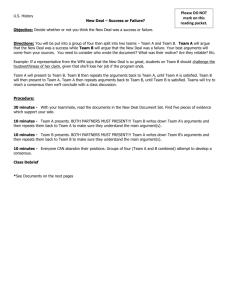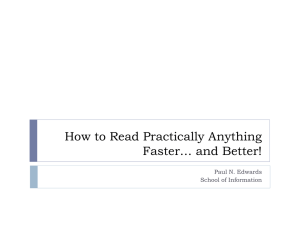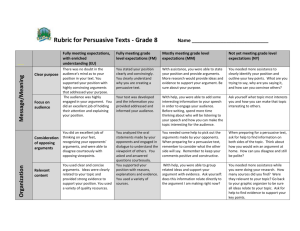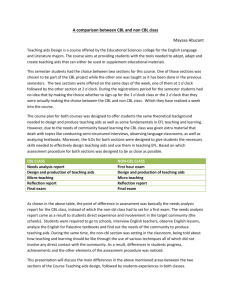Module Specification Form - Computing at University of Dundee
advertisement
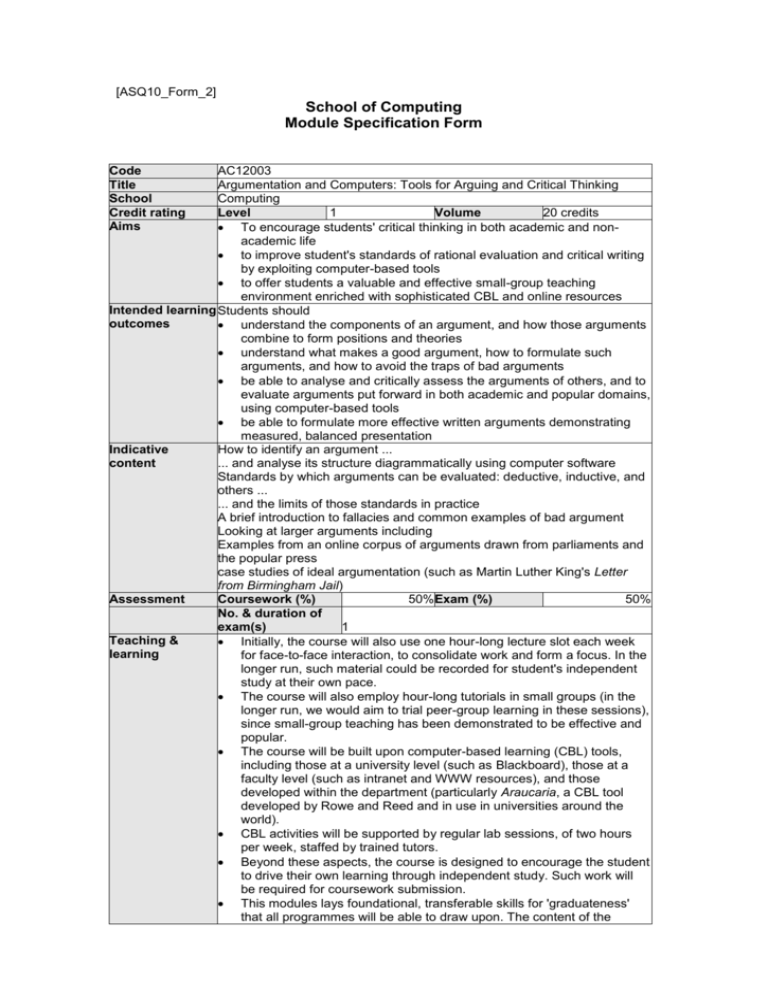
[ASQ10_Form_2] School of Computing Module Specification Form Code Title School Credit rating Aims AC12003 Argumentation and Computers: Tools for Arguing and Critical Thinking Computing Level Volume 1 20 credits To encourage students' critical thinking in both academic and nonacademic life to improve student's standards of rational evaluation and critical writing by exploiting computer-based tools to offer students a valuable and effective small-group teaching environment enriched with sophisticated CBL and online resources Intended learning Students should outcomes understand the components of an argument, and how those arguments combine to form positions and theories understand what makes a good argument, how to formulate such arguments, and how to avoid the traps of bad arguments be able to analyse and critically assess the arguments of others, and to evaluate arguments put forward in both academic and popular domains, using computer-based tools be able to formulate more effective written arguments demonstrating measured, balanced presentation Indicative How to identify an argument ... content ... and analyse its structure diagrammatically using computer software Standards by which arguments can be evaluated: deductive, inductive, and others ... ... and the limits of those standards in practice A brief introduction to fallacies and common examples of bad argument Looking at larger arguments including Examples from an online corpus of arguments drawn from parliaments and the popular press case studies of ideal argumentation (such as Martin Luther King's Letter from Birmingham Jail) Assessment Coursework (%) 50% Exam (%) 50% No. & duration of exam(s) 1 Teaching & Initially, the course will also use one hour-long lecture slot each week learning for face-to-face interaction, to consolidate work and form a focus. In the longer run, such material could be recorded for student's independent study at their own pace. The course will also employ hour-long tutorials in small groups (in the longer run, we would aim to trial peer-group learning in these sessions), since small-group teaching has been demonstrated to be effective and popular. The course will be built upon computer-based learning (CBL) tools, including those at a university level (such as Blackboard), those at a faculty level (such as intranet and WWW resources), and those developed within the department (particularly Araucaria, a CBL tool developed by Rowe and Reed and in use in universities around the world). CBL activities will be supported by regular lab sessions, of two hours per week, staffed by trained tutors. Beyond these aspects, the course is designed to encourage the student to drive their own learning through independent study. Such work will be required for coursework submission. This modules lays foundational, transferable skills for 'graduateness' that all programmes will be able to draw upon. The content of the module addresses all of the SCQF Level 7 objectives, including the understanding and practical components, but also the objectives corresponding to the learners' development of generic skills in analysis and communication. Most conveniently taught in second semester, so that students will have had an opportunity to familiarise themselves with university IT facilities. When taught S2 Modes of delivery & student participation Pre-requisites of entry requirements Accessibility for students with disability In the first year, the module will adopt a mixture of face-to-face, CBL and independent study. The design of the module is intended to simplify delivery as distance learning and CPD beyond the university. Its design similarly lends itself to part-time study. None Students with disabilities are supported on this module through the University's Disability Support Services and will be given appropriate aid and guidance consistent with their disability. Please view the following web resource for further information: http://www.dundee.ac.uk/disabilitysupport/ Support for students with disabilities in the School of Computing is also available. Please view the following web resource for further information: http://www.computing.dundee.ac.uk/staff/awaller/disability.asp Corequisites Antirequisites None (though would form a good complement to Philosophy PI11001 with an emphasis more on the practical). Where part of that module "aims to introduce [the student] to, and to help [the student] to develop, the distinctive and valuable skill of thinking philosophically", the proposed module here aims to teach students to think critically, and to use computer software as a tool, well beyond the domain of philosophy alone). None



